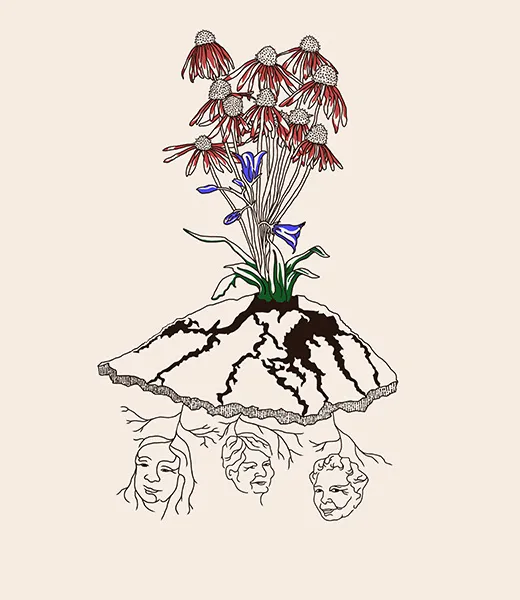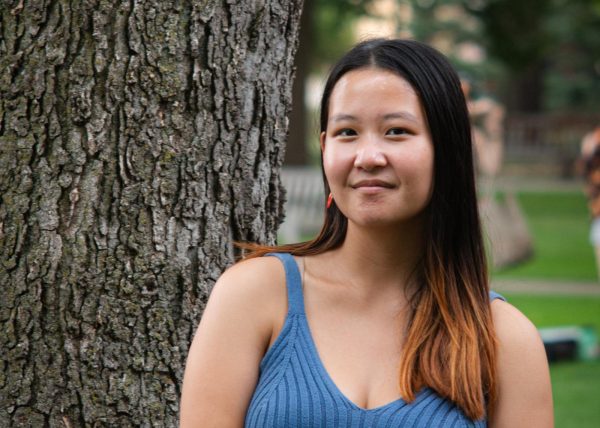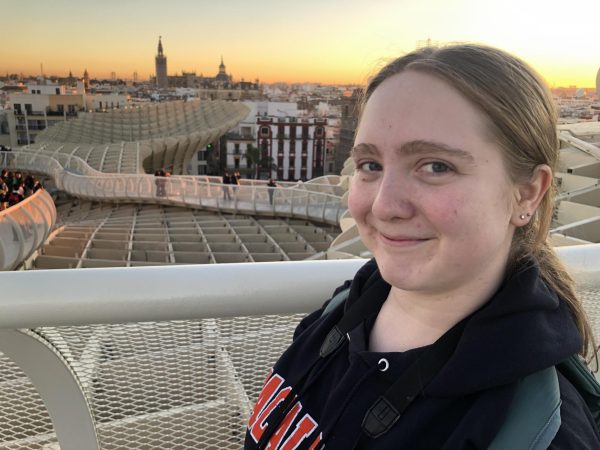International Round Table: exploration in student led sessions

International Roundtable poster. Art by Gabi Estrada ’21.
October 27, 2022
On Oct. 13 -14, Macalester hosted its annual International Roundtable (IRT) event. Four plenary speakers were invited to speak over the course of the two days’ events, and students led seven sessions related to this year’s theme.
Titled “On the (Im)Possibilities of Decolonizing Knowledge and Power,” the IRT focused on the ways in which people can take steps to detach their minds from the ways past ideals still influence modern knowledge and patterns of thinking. It aimed to help participants visualize and speak on the way decolonization connects with education, and how interactions with intersectional ideas will change and shape those who learn in this manner.
The plenary speakers of this year’s IRT were Melanie Yazzie, Marisa Ruiz Trejo, Adam Khalil and Carole Boyce-Davies, who provided a variety of perspectives based on their backgrounds and careers.
The seven student led sessions varied in topic and nature, ranging from talks by invited speakers to small, student oriented group discussions. The sessions were each hosted by two students of varying years with one or two Macalester professors or staff serving as their mentor for the planning process.
The first session, entitled “Who tells your story? Post-independence Hyper-Nationalism, Ethnocentrism, and the National Curriculum,” was led by Khant Wai Yan ’25 and Jess Nguyen ’24 and focused on lost and erased histories. They invited two panelists to speak at the event, Samvartha Sahil and Dr. Meixi.
Sahil is an educator and activist who spoke on language erasure in schools and the disconnect between language and daily life. He also spoke on the idea of a nation, as well as nationalist ideology and how textbooks do not give the full picture of what occurred during colonialism.
Dr. Meixi, a professor at the University of Minnesota who has studied grassroots education with a focus in Thailand, Mexico and the U.S. talked about how colonized relationships manifest in education scenarios. She talked about how there is a separation of education and home life and family knowledge created by legacies of colonialism. Meixi additionally spoke on how there is intimate indigenous knowledge that cannot easily be translated into colonial style knowledge, as well as the debate over the stories that can and should be told.
The student facilitators also presented a short video where they interviewed many people of minority groups both within the US and in other countries from around the Macalester campus and the Twin Cities about education and how the idea of independence was taught to them.
The second session, “Russification and Resistance,” was hosted by Talia Ostacher ’25 and Aliya Nadeeva ’24. They explained how they started working on the session with a focus on Russian minorities, but shifted to the Tatars, which are the second largest ethnic group in Russia.
The session walked through a timeline of Tatarstan, which is a Russian region with an ethnic Tatar majority. Starting in 1552 and finishing in 2017, the timeline ranged in topic from the adoption of the Western model of imperialism in the 1700s to intellectual reform in the 1880s, and, most recently, the suppression of the Tatar language, which was presented by the Russian government as a measure to protect the rights of ethnic Russians.
The guest speaker for the event, Ayzat Minhaci, is the Ambassador for Tatarstan in Turkey. He spoke about how education is important to feel connected to history, but the education system teaches only Russian, not Tatar after a law passed in 2017 by the Russian government which mandates that Tatar can only be taught to those who choose to learn it. Furthermore, Minhaci emphasized how it is easier to control a population when they are less educated, forcing people to blindly follow the government.
“Restorying Indigenity as Praxis of Decolonization,” was the third session, planned by AJ Papakee ’23 and Zaryn Prussia ’23. Guest speaker Fern Wrenville, a Dakota storyteller, told a traditional Dakota story and used it as a way to explain how stories are a way to connect with the past. She also talked about how this tradition was interrupted by colonialism. She talked about how stories are teachings and used to connect deeply with one another and with history.
The two mods set goals for the session, including looking at how Indigenous storytelling is a decolonization practice, and how disrupting academic approaches can offer a more heart-based approach.
The session then moved into discussion of the History of the White Earth Reservation, which is located in northern Minnesota. Forcing Anishinaabe people onto the reservation, the move was intended to dispossess Anishinaabe people of their resources and land and integrate them into “proper society.” The land has been settled due to the lack of protections, and the language has no living first-language speakers.
Lastly, they moved into a discussion of decolonization as an act of restoration, as well as how contesting where our knowledge comes from connects to decolonization. Participants were asked to consider their own sense of self and how history is recorded, as they reflected on and ended the session.
Starting off the sessions on the second day of the IRT was “Decolonizing Beauty Standards 101,” hosted by Rola Cao ’25 and Zhihao Liu ’24. Cao explained that the reason for choosing this topic was the preference for lighter skin in both Asian and African American communities, and her curiosity surrounding this standard of beauty. The session included three speakers, Amira Adawe, Leah Donnela and Gabrielle Gayagoy Gonzalez, who spoke about their roles and activism.
Adawe is the founder and director of the Beautywell project, a non-profit organization that works to prevent the perpetuation of harmful skin-whitening practices. She spoke on the concept of colorism and how its reach extends into day to day life, as well as the harmful effects of the toxic chemicals and their detrimental health effects. Her organization is working towards passing legislation that would regulate skin lightening products containing these harmful chemicals.
The second speaker, Donnela, is an NPR editor and sociocultural critic. She spoke about how beauty products are used as a tool to exert power and control over how others perceive themselves, and how beauty is an artificial creation by humans. According to Donnela, the idea of changing one’s appearance to be perceived as beautiful falls into the trap of beauty as power.
Gonzalez, the final speaker, is a marketing and PR strategist for a global identity, equity, inclusion and justice group. In her view, decolonizing beauty means making space for all representations of beauty and allowing people to feel beautiful in their own ways. Gonzalez explained that students can show their awareness in decolonizing beauty standards by purchasing products from and supporting companies that are run by women of color.
After each individual speaker talked about their experience and work, the session was opened up for questions. The questions focused on the role of the male gaze, intersectionality between colorism and gender as well as research on androgenous beauty norms. Participants were also curious about the way in which the ideas discussed impact local communities here in Minnesota and the Twin Cities.
The next session was “Storytelling: A Decolonial Praxis in Personal Accountability and Compassion,” hosted by Uditi Chandrashekar ’24 and Dipakshi Sarma ’24. Aligning with several other sessions, it highlighted whose stories get told, as well as how community exists and is created through oral tradition in India.
The two hosts talked about their different views of their own South Asian identities, and claiming kinship with those involved in the colonized world. They also discussed the idea of collective liberation through personal narratives and interactions between individuals. They wanted to examine the idea of objectivity in academia as well as privacy and power, and how it can be easy to contextualize the pain that others are experiencing.
The hosts wanted the audience to be able to participate in their own decolonization, so rather than having a main lecture section or including panelists, the session focused almost entirely around small group discussions. These discussions, composed of two to four participants, focused on the personal experiences of the attendees and how they can inform decolonization practices.
“Decolonization in Turtle Island and Palestine and the Role of Jewish Resistance” was the third session, run by Gabe Karsh ’25 and a student who has chosen to remain anonymous, ’25. The session hosted three panelists, Rebecca Miles, Rabbi Jessica Rosenberg and Mark Ayyash.
Miles is an Indigenous activist and executive director of the Nez Perce Tribe, while Rosenberg is a writer and teacher of trauma informed pedagogy in Jewish education, ritual and organizing. Ayyash is a Professor of Sociology at Mount Royal University in Canada and a book and newspaper author as well.
The session covered subjects such as resistance of settler colonialism in Turtle Island and Palestine and the role of religion in colonialism. The panelists fielded questions about Jewish support of Palestine, how non-indigenous people can support indigenous activism and how tradition and history inform the panelists’ work.
The subject of perspectives on the same religion varying between countries, as well as the idea of weaponized religion were also discussed, including how religion has been used to defend settler colonialism and political agendas in the case of the Israel/Palestine conflict.
The last session was “Content Creation as Decolonisation: An African Perspective,” hosted by Chevonne Kwarisiima ’24 and Michelle Osiro ’24. Their invited presenters were Dr. Ijeoma Kola, Ivy Mugo and Mbali Sebokedi.
Kola is a Nigerian-American historian, content creator and advocate for Black women’s health and education. Mugo is a Kenyan blogger, Youtuber and marketing specialist, who focuses on financial literacy and female empowerment. Sebokedi is a South African content creator who focuses on promotion of African literature and is pursuing a Masters in literary theory, specifically motherhood and nationhood.
The panelists answered questions covering topics such as movement away from colonial systems, their personal definition of colonialism and how they find the motivation to create content in an honest and personal way. They also spoke about the differences in representation between academic literature and ways in which people with different perspectives measure success.
The session finished with a Q&A session, where the panelists were asked about how they stay safe online, as well as the perspectives of those who consume their content and whether or not they agree with the panelists’ own views.
Over the course of the two days, the sessions explored a variety of different perspectives on the subject of education and decolonization worldwide. They incorporated different topics and cultural backgrounds, and emphasized how those working towards decolonization must be intentional about how they are learning and unlearning during the process.
*Cal Martinez, Grace Xue, Kamini Ramakrishna and Noah Riccardi contributed to the reporting for this story.














